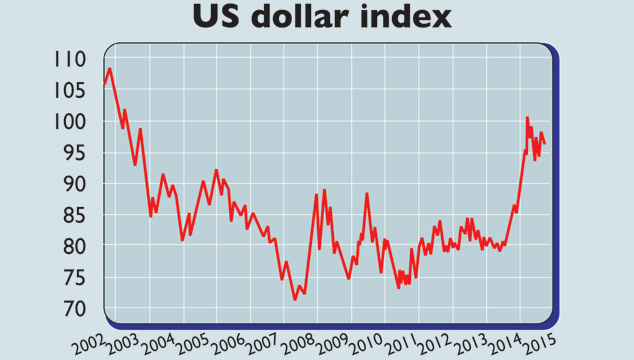Will the buck stop here?
The ever strengthening dollar has hit overseas sales for America's S&P 500 companies.

Get the latest financial news, insights and expert analysis from our award-winning MoneyWeek team, to help you understand what really matters when it comes to your finances.
You are now subscribed
Your newsletter sign-up was successful
Want to add more newsletters?

Twice daily
MoneyWeek
Get the latest financial news, insights and expert analysis from our award-winning MoneyWeek team, to help you understand what really matters when it comes to your finances.

Four times a week
Look After My Bills
Sign up to our free money-saving newsletter, filled with the latest news and expert advice to help you find the best tips and deals for managing your bills. Start saving today!

The US dollar is up by 20% in trade-weighted terms (measured against a basket of its major trading partners' currencies) over the past year, and is close to a 12-year high (see chart). This has been good for American travellers.
But it has hit overseas sales for S&P 500 companies, who now look set to forfeit around $100bn of revenue this year, more than the total earned by Nike, McDonald's and Goldman Sachs combined, say Eric Platt and Kadhim Shubber in the Financial Times.
The dollar bull has undermined commodities, which are priced in the US currency. This in turn has hit growth in emerging markets, some of which are also being squeezed by the rising cost of dollar-denominated debt or by pegging their currency to the dollar (which will make their currencies rise too). Unfortunately for emerging markets and US multinationals, these trends may endure as the dollar climbs further.
MoneyWeek
Subscribe to MoneyWeek today and get your first six magazine issues absolutely FREE

Sign up to Money Morning
Don't miss the latest investment and personal finances news, market analysis, plus money-saving tips with our free twice-daily newsletter
Don't miss the latest investment and personal finances news, market analysis, plus money-saving tips with our free twice-daily newsletter
The currency markets "tend to have very, very long cycles", says BK Asset Management's Boris Schlossberg. Deutsche Bank says that only the Japanese yen and Norwegian krone have weakened as much against the dollar at this point, as during the last two major dollar bulls, in the 1980s and 1990s. That suggests further upside.
The fundamentals point the same way. Even if the jitters surrounding China's devaluation of the yuan delay the first increase in US interest rates in almost a decade, the basic picture hasn't changed: America is gradually moving towards tightening monetary policy, while none of its major rivals are, except the UK.
Indeed, the European Central Bank and the Bank of Japan could print more money if they grow more concerned about undershooting inflation targets. China is now weakening its currency. Emerging markets are grappling with structural problems and the prospect of capital leaving their traditionally risky shores, due to the lure of higher yields on US securities. In recent years, moreover, America has reined in its budget and current account deficits, which is also bullish for the currency.
In short, "the dollar definitely has a tailwind behind it", says Schlossberg. Morgan Stanley thinks the dollar is especially likely to perform well against commodity and emerging market currencies and that it will climb to parity with the euro by the end of next year, a rise of 10% from current levels.
Get the latest financial news, insights and expert analysis from our award-winning MoneyWeek team, to help you understand what really matters when it comes to your finances.

-
 Should you buy an active ETF?
Should you buy an active ETF?ETFs are often mischaracterised as passive products, but they can be a convenient way to add active management to your portfolio
-
 Power up your pension before 5 April – easy ways to save before the tax year end
Power up your pension before 5 April – easy ways to save before the tax year endWith the end of the tax year looming, pension savers currently have a window to review and maximise what’s going into their retirement funds – we look at how